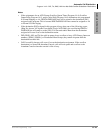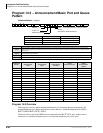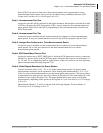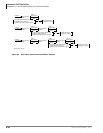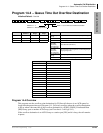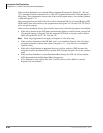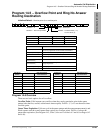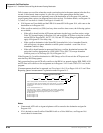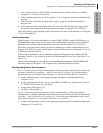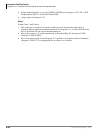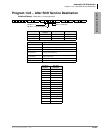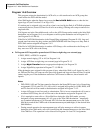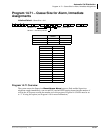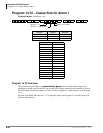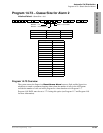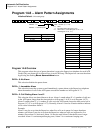
Automatic Call Distribution
Program 14-5 – Overflow Point and Ring No Answer Routing Destination
Strata DK Programming 5/99 6-27
Automatic Call Distribution
♦ If no overflow point is selected (DATA = 0) and the queue overflow time is set to infinity
(Program 11-1), calls do not overflow.
♦ If the overflow operation is at overflow points 1, 2, or 3, assign the overflow destination in this
program.
♦ If the overflow occurs after the queue timer expires, assign the overflow destination in
Program 14-4.
♦ If all Agents are in the Unavailable mode, CO calls to the ACD Group can be routed to the
assigned overflow destination in this program as an option (see Program 10-4 LED 04).
ACD calls that ring Agent telephones and are not answered route to the destination set in Program
14-5 (see Flowchart 6-7).
Overflow Operation
If the Program 14-5 overflow destination is a station [PDN], [PhDN], another ACD Group, or, a
Distributed Hunt Group and it is busy when a call overflow point is reached, the call remains in
queue until the overflow point destination becomes idle. (See Flowcharts 6-2, 6-3 and 6-4.)
When the overall queue timer expires, the call also attempts to overflow to the destination set in
Program 14-4. The call is sent to an idle Agent or to the overflow point set in Programs 14-4 or 14-
5, whichever becomes idle first.
If the overflow destination is the Normal Ring assignment (Programs 81, 84, and 89), the DK
Attendant Console, or AA, overflow occurs even if the destination is busy. See Flowchart 6-4 on
Page 6-44.)
If the overflow destination is the DK AA or Normal Ringing assignments, DID/Tie/DNIS/ANI
line calls overflow to Program *14-2 assignment only when the destination is idle.)
Non-Repeating Queue Announcement
Case 1—Provide callers with one announcement, followed by music until the call is answered by
an Agent or until the call overflows — refer to Flowchart 6-8 on Page 6-48. (Overflow time is
determined by the overall queue timer; Program 11-1, one second to one hour or no overflow.)
♦ Assign Announcement 1 to the appropriate digital announcer standard telephone port
(Program 14-31).
♦ Assign Announcements 2 and 3 to any vacant PDKU or PEKU port. (Program 14-32 and 14-
33 , DATA = XXX vacant port. See Notes.)
♦ Assign music in Program 14-34.
♦ See Notes, following Case 2.
Case 2—Provide the following sequence to callers: Announcement 1, followed by Music 1,
Announcement 2, and then continuous music until the call is answered by an Agent or until the call
overflows — refer to Flowchart 6-10 on Page 6-51. (Overflow time is determined by the overall
queue timer; Program 11-1, one second to one hour or no overflow.)
♦ Assigns Announcements 1 and 2 to the appropriate digital announcer, standard telephone port
(Programs 14-31 and 14-32).



